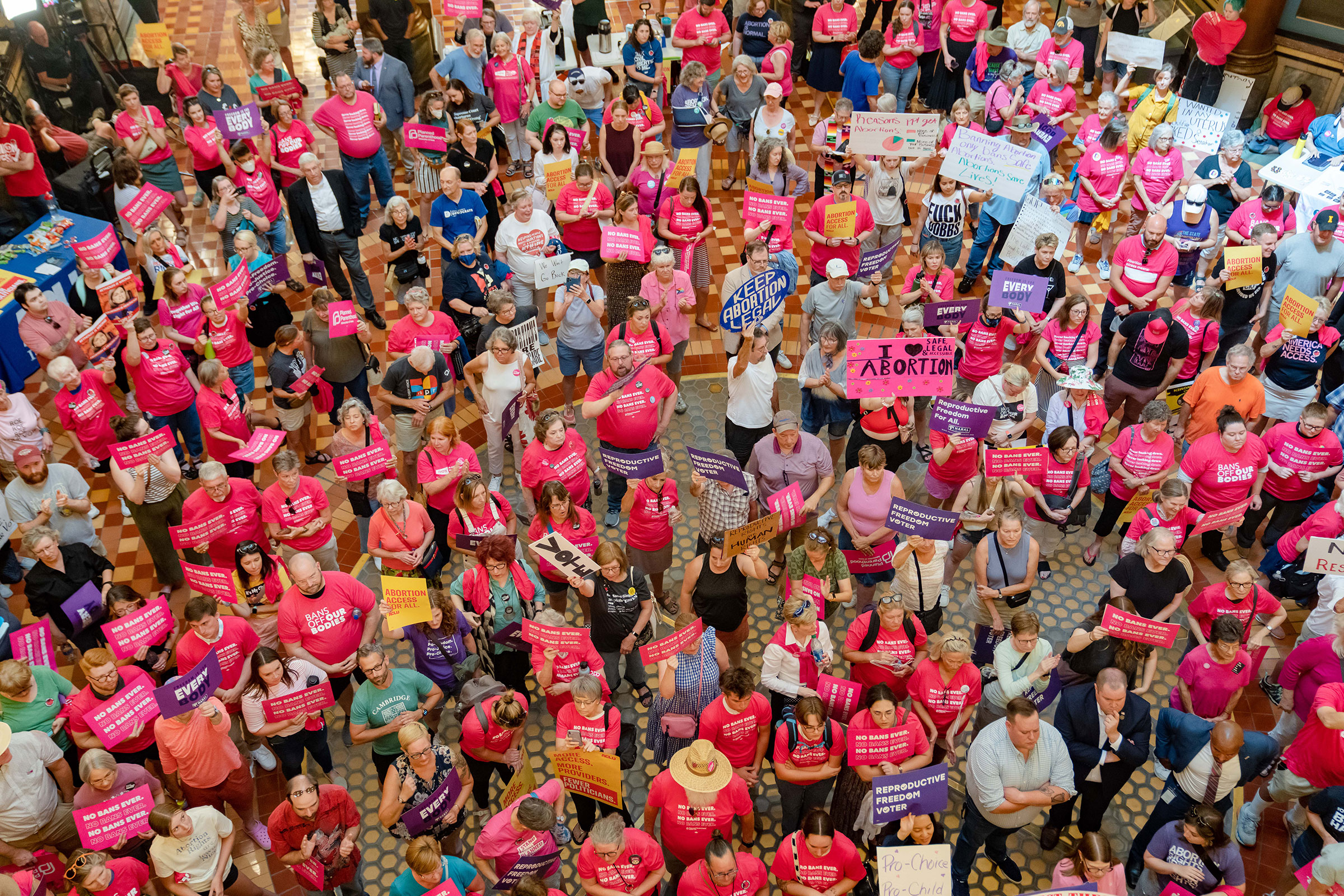
Reproductive health clinics in Iowa are scrambling to see as many patients as they can before the state’s ban on abortion as early as six weeks is expected to go into effect on Friday.
“There’s been a lot of frustration, a lot of anger, but also a lot of galvanized resolve among myself and staff to keep doing everything we can for our patients right up until the ban, and then working within the parameters of the law afterward, to continue being here for our patients as much as possible,” says an OBGYN-trained doctor, who works at a Planned Parenthood clinic in Des Moines, Iowa and requested anonymity out of concerns for her safety.
The state’s new bill bans abortion as soon as an ultrasound can detect embryonic or fetal cardiac activity. It has narrow exceptions for a “medical emergency” as well as rape or incest, if the incident was reported to law enforcement or a public or private health agency. Governor Kim Reynolds has said she plans to sign the bill into law on Friday, and it would take effect immediately afterwards. She had called the Iowa legislature into a rare one-day special session on July 11 “for the sole and single purpose” of passing this bill.
Read More: Iowa’s New 6-Week Abortion Ban Just Became a GOP Litmus Test
Planned Parenthood, along with the ACLU and the Emma Goldman Clinic, have sued state officials over the legislation, seeking a temporary injunction to prevent the legislation from going into effect. A hearing on the temporary injunction is scheduled for Friday afternoon before Reynolds plans to sign the ban. It is unclear whether the judge will provide a decision before the signing.
That leaves Iowa providers unsure of what the laws governing abortion will look like 24 hours from now. Planned Parenthood provides abortions at two Iowa health centers, in Des Moines and Iowa City; these facilities provided more than 3,300 abortions in 2022. When the legislature approved the abortion ban on Tuesday night, Planned Parenthood canceled some patients they thought would have already met the cardiac activity standard. “But when we discovered the governor wasn’t going to sign it until Friday, we got right back on the phone,” says Dr. Sarah Traxler, Chief Medical Officer of Planned Parenthood North Central States. Staff called patients back to try and see as many people as they could before Friday.
The organization is dealing with a “delicate balance,” Traxler says, of “keeping patients on schedule” but also being wary of patients who may have planned to drive several hours only to be told that they can’t be seen because the law has gone into effect. “Toeing that line, it’s pretty hard,” she says.
The clinics have been packed. In general, Planned Parenthood’s Iowa clinics that provide abortions see up to 24 patients a day, according to Traxler; on Wednesday, they had “double or triple overbooked,” she says. Staff are working longer hours, sometimes coming in on vacation days and switching around childcare. “It’s an all-hands-on-deck type of situation right now,” the doctor at the Des Moines clinic says.
Another challenge for reproductive health clinics is a 24-hour waiting period that Iowa already requires for getting an abortion. Patients must get two separate appointments at least 24 hours apart, which means it’s possible that some patients who have had their first visit may not be able to complete their second visit without a judge handing down an injunction on Friday, says Francine Thompson, executive director of the Emma Goldman clinic, a nonprofit independent organization that provided 686 abortions from October 2021 through September 2022. “There’s lots of fear and confusion about that,” Thompson says. “The confusion is intensified, along with the fear and we recognize that it’s not accidental… and that the legislature has spent years attacking abortion care and imposing medically unnecessary barriers to care.”
If the law goes into effect, abortion providers know they will be unable to do the procedure once embryonic or fetal cardiac activity is detected. If it’s still before that cutoff, they can provide an abortion. But if not, they say they will refer patients to a clinic in another state where they can be seen. “For patients living in Iowa, that’s going to be Nebraska, Minnesota, or Illinois,” Traxler says. She notes that Nebraska just approved a 12-week abortion ban, so if patients were farther along in pregnancy, that would not be an option either.
For now, the Des Moines doctor feels empowered that she and her staff are able to help patients who may be the last ones to receive abortions at these stages in Iowa for a long time. “I’m proud to be able to do that work,” she says. “The patients are extremely thankful.”
More Must-Reads from TIME
- Donald Trump Is TIME's 2024 Person of the Year
- Why We Chose Trump as Person of the Year
- Is Intermittent Fasting Good or Bad for You?
- The 100 Must-Read Books of 2024
- The 20 Best Christmas TV Episodes
- Column: If Optimism Feels Ridiculous Now, Try Hope
- The Future of Climate Action Is Trade Policy
- Merle Bombardieri Is Helping People Make the Baby Decision
Write to Sanya Mansoor at sanya.mansoor@time.com